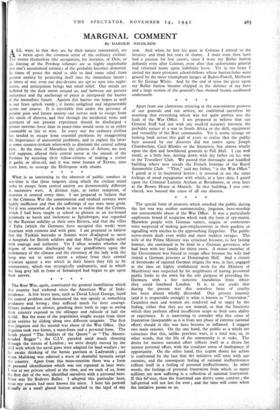What is so interesting to the observer of public conduct
in war-time is that these tangents along which the civilian mind seeks to escape from central anxiety are demonstrably different in successive wars. A. distinct type, or rather symptom, of neurosis is created every time. I am prepared to believe that in the Crimean War the commissariat and medical services were highly inefficient and that the sufferings of our men were great. Yet it was somewhat of a shock to me to realise that the Crimea, which I had been taught at school to picture as an ice-bound peninsula as harsh and inclement as Spitzbergen, was regarded by the Russian nobility as their own Riviera, and that the villas of Yalta (which the Germans have occupied this week) were luxuriant with mimosa and with pine. I am prepared to believe that the Turkish barracks at Scutari were ill-adapted to serve as hospitals for British soldiers and that Miss Nightingale acted with courage and authority. Yet I often wonder whether the• degree of emotion discharged by our grandfathers upon the inclemency of the climate and the clemency of the lady with the lamp was not to some extent a release from their central irritation against- a war which in their hearts they felt to be unnecessary, which was strategically undramatic, and in which the long grey lull in front of Sebastopol had begun to get upon
their nerves. * * * *






















 Previous page
Previous page